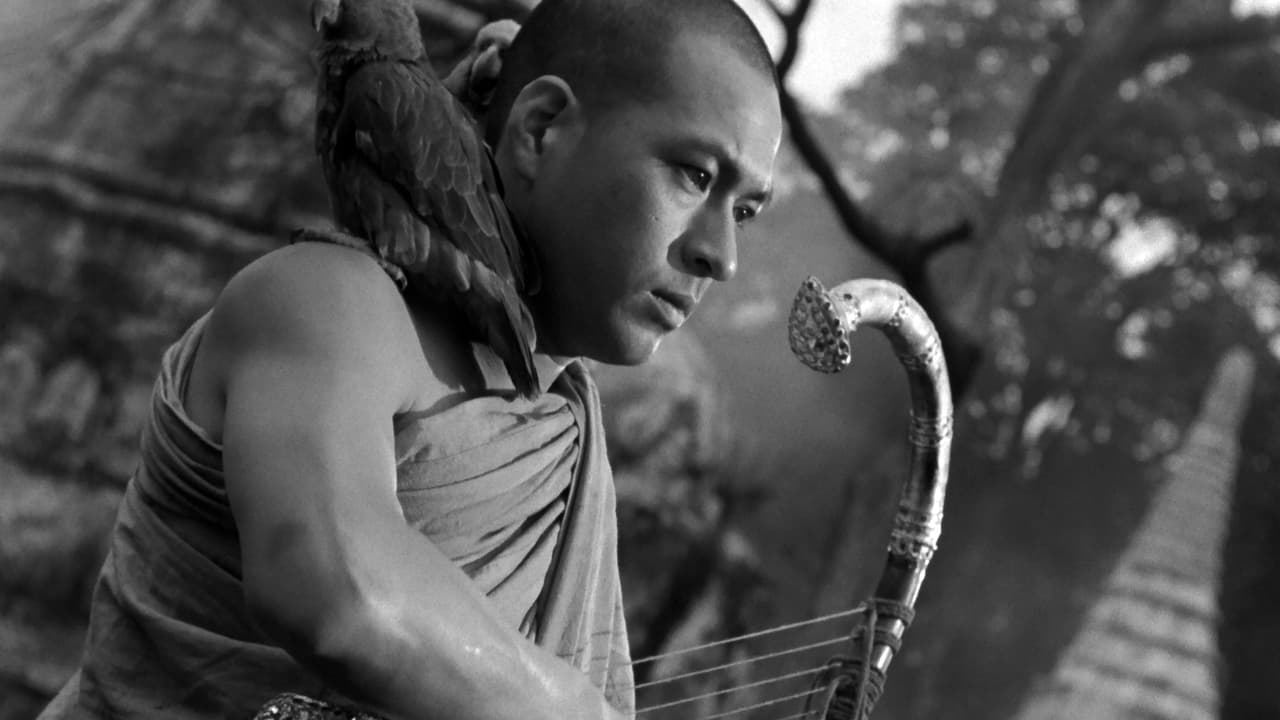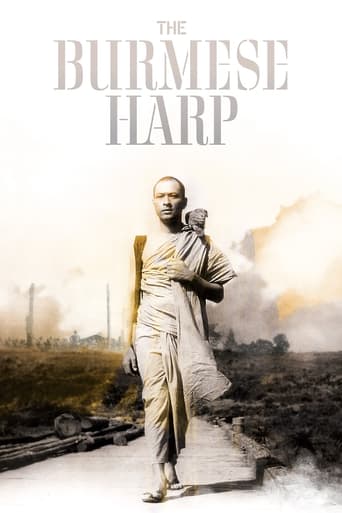

The war theme was quite popular during the post-war period in different kinds of arts, especially film production. Therefore, we can observe lots of films, which were under strict censorship of governments, about the particular battles, persons or big events with a purpose to agitate a patriotism and undermine the reputation of the ex-enemy. Therefore, on the background of these films, Kon Ichikawa tried to shoot a film about the war, without single propaganda for or against anyone. Instead, he "filled" the film with the abstract thoughts about life, which are tightly connected with Buddhism, during the war and, literally, lots of songs and hymns. That is why you could get it as Japanese musical about war with some deep meaning. Due to the shooting date, I cannot properly assess the picture and sound quality: the main thing - you see and hear something. However, there is no doubt about the cast. The play of every soldier of Captain Inouye's group was felt as a representation of real soldiers of WWII because you could see individual thoughts and feelings towards particular events around them. Moreover, Rentaro Mukini, who had a starring role, showed the exemplary model of commander, who cares about the people's lives more than heroic actions with the clear death of the whole troop. Still, Mr. Yasui, who played the central personage of the whole film - Mizushima, made a great effort to persuade the audience that there could be a sudden enlightenment and decision to stay at Burma, despite that you have a chance to go back home. Sudden decision to become a monk. Certainly, the director was inspired by Zen Buddhism, especially the Rinzai school and its idea of gradual enlightenment. According to broad claim, this film was as recognized Buddhistic, due to the several signs as the speech of the monk "Burma is Buddha's country". But, I could not agree with it. The presence of temples and monks adds certain level spirituality and, in this case, serves as vital bond in the screenplay for more dramatic upshot rather than a sacred message to the audience. To sum up, the audience of this film is certainly sufficiently narrow. If you want to be in this group, you must have: 1) certain interest in the World War II history; 2) desire to watch the 2-hour-long black-and-white grainy film; 3) patience toward simple and obvious plot. At the end of watching, you can surely say that you watched worthy Buddhistic film from respected Japanese director.
... View MoreWhat a wonderful film! It is an adaptation of a Japanese novel by Michio Takeyema. The performances, camera-work and the music (of Akira Ifukube) under the direction of Kon Ichikawa are as delightful as the tale of the novel. Anti-war plus humanism plus a inward look at the Japanese psyche and nationalism from a Japanese perspective. It also provides a lovely peek at Myanmar when it was known as Burma. One of the best Japanese films ever made.For those who might be reading the name of Akira Ifukube for the first time, he is one of the most respected Japanese composers who was initially influenced by the music of Igor Stravinsky but grew up on Japanese musical traditions. What he offers is always an unusual mix of European and Asian music, He contributed the music of the Godzilla monster films. The Ichikawa-Ifukube combination proved to be vital for this remarkable film of a very interesting novel.Director Ichikawa remade the film in color three decades later in 1985.
... View MoreTowards the end of WWII, a group of Japanese soldiers struggle through the chaos of national disintegration, trying to reach the border through the Burmese jungle. Their Captain is musically trained and forms them into an ad hoc male choir in order to maintain morale. Foot soldier Mizushima plays the titular instrument and as such become a talismanic figure in the group. When he later disappears and suffers an existential crisis, his fate comes to obsess the group as a whole.Ichikawa's iconic piece contains a strong anti-war theme that survives beyond its 1945 setting. Mizushima's troop are timeless, soldiers dreaming of homes, wives, town festivals; clinging to nostalgia to guide them home and fighting on for each other rather than any greater cause inspired by the imagined national community. Much more identifiable with the period are the troop holding out against the British even after national surrender, fanatics looking to die for an Emperor who has forsaken them rather than return to their families and rebuilding of the community. Among these men, there are no songs.Mizushima's conversion from soldier-musician to selfless monk symbolises a state of reflection that follows all armed conflict. The film has been criticised for failing to confront the barbarism of the Imperial army, but this lack of identification with specific national failings is what gives the film a theme that transgresses to other cultures, conflicts and evils - the coming to terms with a life to be lived in the aftermath of horror. The flaws on the Yamato spirit may not be interrogated, but the atrocities of war are present, most visibly in Mizushima's encounter with the rotting flesh of fallen comrades being picked over by scavenger birds. The framing is impeccable, and those looking for a quintessential Japanese aesthetic will be surprised by the extensive use of closeups. The music is spare and suitably evocative of military camaraderie and frightened young men coping far from home. Mizushima's journey is both symbolic and highly plausible, as is the reaction of his brothers-in-arms. Great cinema in its own right, and at the very top of the tree in anti-war movies.
... View MoreLast Thursday night I was sitting in a tiny Amtrak station in Bloomington, Illinois waiting for my train to take me to my beautiful girlfriend in Chicago. As I sitting there, I was joined by a group of stereotypical sorority girls from Illinois State University. For almost an hour I was subjected to their countless stories about meaningless sex, Lady Gaga and the "pounding of shots" that they were so excited to soon be doing in the windy city. By the time we boarded the train, I had realized that I was alone in the car with these five exhausting females. I scurried to the far back to make sure that I could secure a seat by myself and far away from these strangers.My efforts were in vain because one of them spotted my fraternity letters and found it necessary to try and sit next to me. "You're a frat boy, you may enjoy some of my stories". I could not think of any other way to make her leave me alone, so I whipped out my laptop and started watching my next film from the 1077. "What 'cha watchin'" she asked. I answered - "a black and white Japanese anti-war movie made in 1956". After hearing this, it did not take her long to jump out of her seat and rejoin her group of woo-girls. The Burmese Harp saved the day.Little did I know that this movie would not only save me from two hours of annoyance, but it would also be an extremely rewarding viewing experience. Though I was watching it on my laptop, I was still in awe of the Criterion DVD quality and the flawlessness of the hushed black and white. The cinematography is simple and the landscaping of Burma is vast and magnificent looking. It was easy to see that the filmmaker was not interesting in a mass amount of dialogue. It was the striking subtlety in the visual style that properly denoted the overall theme of the movie.The Burmese Harp is about a Japanese soldier stationed in Burma during the days immediately following the end of World War II. He has developed a love for playing the harp and uses it to signal danger to his troop. His playing is also used as a way to raise moral in the lonely mountains of Burma. Music, whether instrumental or vocal, plays a major role in the film. In fact, it seemed like the majority of the communication was presented through song. The sound of the harp is soothing and easy on the ears. It is a beautiful instrument that compliments the smooth visuals.The story is also vividly entertaining in is simplicity. After retreating to the British, the soldier - Mizushima - is sent to try and convince another Japanese troop to surrender. He fails in doing this and the entire troop is eventually killed by British forces. This leads to Mizushima, and his harp, being separated from his fellow soldiers and he is now left to roam the countryside of Burma. As we walks, he meets a spiritual leader and realizes the devastatingly high amount of Japanese casualties caused by the violence of World War II. He sees the bodies of thousands of soldiers with his own eyes. He is traumatized and dedicates his life to giving them a proper burial.The Burmese Harp is the first film by Kon Ichikawa to be seen outside of Japan. It is also one of the first Japanese movies to receive critical acclaim in the United States. What really makes it stand out is that it was the first example of an anti-World War II statement being made by the Japanese through cinema. We forget that everybody is hurt by war, and that the lines are not always as clear as good versus evil. The men in the Japanese army had families, kids and dreams of their own. They just wanted to return home - though they would find that home hardly existed as they knew it before the war.Yes, I may be in debt to The Burmese Harp for saving me from the incoherent ramblings of a loud and proud party animal, but I also legitimately enjoyed it on almost every level. This is a great movie and could serve as an outstanding introduction into Japanese, Asian or world cinema. I am a big fan. I immediately bought the Criterion DVD. You should borrow it sometime...
... View More